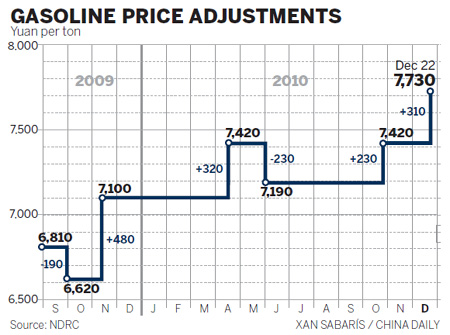Inforgraphic
Fuel hikes reflect market
Updated: 2010-12-22 09:06
By Wang Xiaotian and Chen Limin (China Daily)

BEIJING - Gasoline and diesel retail prices will rise by around 4 percent on Wednesday, reflecting global market fluctuations, but officials and researchers said the increases will have only a limited effect on inflation.
The National Development and Reform Commission (NDRC), the country's top economic planner, said on Tuesday that gasoline prices would go up by 310 yuan ($46.55) per ton, and diesel prices by 300 yuan per ton. Following the adjustments, gasoline prices are now 7,730 yuan per ton with diesel trading at 6,980 yuan per ton.
Liu Zhenqiu, vice-director of the NDRC's price department, said the impact of the price hikes on consumer prices will be limited.
"It will probably contribute 0.07 percentage points to the month-on-month increase of the Consumer Price Index (CPI) this month," Liu said.
To combat inflationary pressures, the government released food stockpiles in November to cool rising prices.
"There is no doubt that gas prices should follow the market, but as we can see, it's far from easy for the government to make changes. We are in a very difficult situation," said Lin Boqiang, director of the China Center for Energy Economics Research at Xiamen University.
The NDRC's Liu said the third price hike this year is in line with global oil prices that have increased by more than 4 percent in 22 working days, the threshold to adjust domestic refined oil prices under a 2009 pricing mechanism.
Oil futures in New York have risen 9.5 percent from Nov 18.
"It is a choice made for the general economy and long-term development. The purpose is to further reform the price-forming mechanism of resources and restrain excessive growth of domestic demand for refined oil," Liu said.
China has adjusted fuel prices four times this year, with three price hikes and one reduction.
The NDRC said on Tuesday that the average daily consumption of both gas and diesel hit record highs in November, with total monthly gas consumption reaching 5.38 million tons and diesel at 13.16 million tons. This marked a year-on-year increase of 4.6 percent for gas and 21.4 percent for diesel.
However, China's crude oil imports slowed down to 18.09 million tons in November, growing by just 1 percent year-on-year. Total crude oil imports in the first 11 months of this year were 207.38 million tons, an 18 percent rise year-on-year.
"The gas and diesel price rises will not have an immediate effect on inflation because it usually takes some time for changes in energy prices to exercise influence," said Xiamen University's Lin.
| ||||
At a Sinopec gas station near the North Fourth Ring Road in Beijing on Tuesday evening, Chu Yuanxi said he only drives one day a week and normally takes buses or the subway.
"If the price of gas continues to rise, I will probably choose not to drive anymore," said Chu, who drives a Volkswagen Sagitar.
To reduce inflationary pressure, the price of rail and urban public transport, freight, and the aviation fuel surcharge will not be increased, the NDRC said.
The government emphasized that the move won't affect low-income groups and the Ministry of Finance promised to grant more subsidies to related industries and farmers.
E-paper

Ear We Go
China and the world set to embrace the merciful, peaceful year of rabbit
Preview of the coming issue
Carrefour finds the going tough in China
Maid to Order
Specials

Mysteries written in blood
Historical records and Caucasian features of locals suggest link with Roman Empire.

Winning Charm
Coastal Yantai banks on little things that matter to grow

New rules to hit property market
The State Council launched a new round of measures to rein in property prices.




